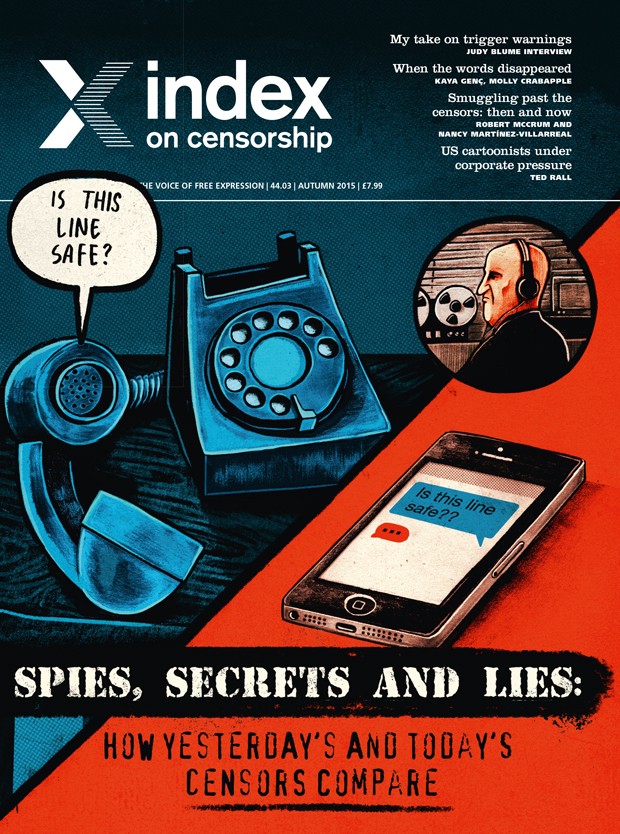24 May 2016 | About Index, mobile, Music in Exile, News and features

Jodie Ginsberg, CEO Index on Censorship. Credit: Eric Hobson
Thanks to generous support from fans at a gig for Malian rock band Songhoy Blues at The Roundhouse in London, Index on Censorship raised more than £1,800 on Saturday to support its new fund for persecuted musicians.
Reflecting on the music ban imposed by extremists in northern Mali in 2012, Index chief executive Jodie Ginsberg reminded a capacity crowd of the threats faced by musicians worldwide. “If we don’t support these musicians, the next act would not be Songhoy Blues but an empty stage,” she said.
The money raised will go towards supporting the Music in Exile Fellowship — part of Index’s Freedom of Expression Awards programme — to support a group or individual facing persecution for their work.
Over £200 was also raised at a special screening of the film They Will Have to Kill Us First, whose producers came up with the idea for the fund, at the Everyman in Belsize Park on Saturday afternoon.
“The response of the audiences at Saturday’s events was amazing — we’re delighted,” Ginsberg said. “Few people can imagine a world without music, and the support for the fund shows just how important it is to so many people to make sure we don’t end up with such a world.”
The first Music in Exile Fellow — Serge Bambara, aka Smockey — will be performing in London in July.
If you would like to support the fund, please text BAND61 £10 to 70070 to donate £10 or visit our Justgiving page.
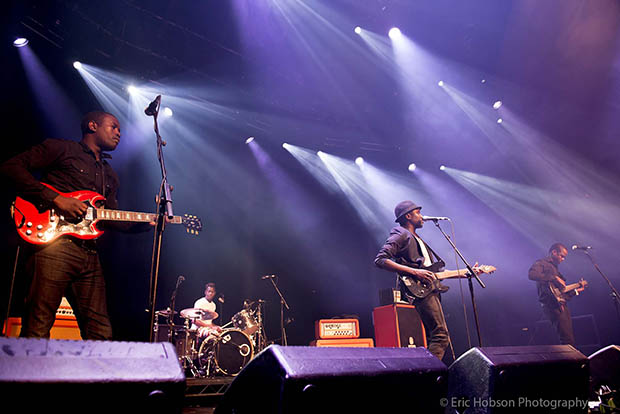
Songhoy Blues at The Roundhouse, May 2016. Credit: Eric Hobson
3 Mar 2016 | Campaigns, mobile, Music in Exile, Press Releases
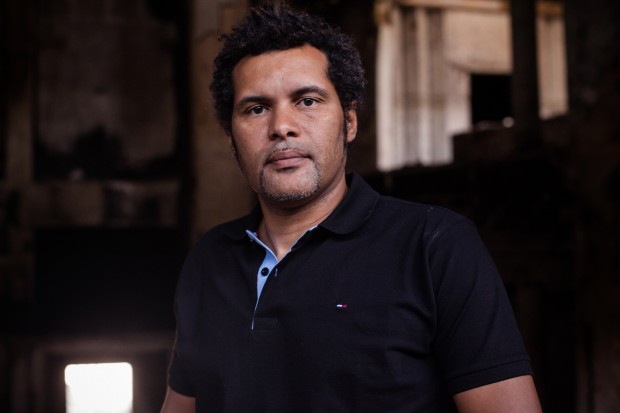
Freedom of expression campaigners Index on Censorship and the producers of award-winning documentary They Will Have To Kill Us First are pleased to announce the Burkinabe rapper and producer Serge Martin Bambara (aka Smockey) as the recipient of the inaugural Music in Exile Fund Fellowship.
An icon of democracy in Burkina Faso, Smockey is an artist, music producer and political activist who fuses hip-hop with traditional local sounds and satire. His acclaimed Studio Abazon was fire-bombed in late 2015 in retaliation for his role in the ending of the 27-year tenure of former President Blaise Compaoré.
As winner, Smockey will perform live in London as well as participate in the Index on Censorship Freedom of Expression Awards fellowship week in April 2016 – an intensive week of coaching and networking for global champions against censorship. With high level training in advocacy, fundraising and digital security, Index supports these activists to stand up to the pressure of censorship and continue their battle for free expression around the world.
“Serge Bambara’s overtly political music has not only made him an extremely popular figure in his own country, Burkina Faso, but also a target for entrenched interests. Throughout his career he has used his talents to battle corruption and demand a democratic future for Burkina Faso. Proof of the power of art and music, we are delighted to have him as the inaugural Music in Exile fellow,” said Jodie Ginsberg, CEO, Index on Censorship.
“Not everyone is lucky enough to have a microphone in front of them, so if you have the chance to talk, you have to say something important and try and change humanity,” Serge Bambara said. Smockey’s work tackles tough political and social subjects. His song Votez pour moi lampoons the lack of democracy in Burkina Faso, A qui profite le crime calls out government corruption and Tomber la lame tackles female genital mutilation.
In September 2015, Smockey’s studio was bombed during a military coup by forces loyal to the former president – an act designed to intimidate him and Burkina’s youth. After seven days of international pressure, the junta returned power to the provisional government but Studio Abazon, a former hub for young and aspiring musicians in Burkina Faso, was damaged beyond repair.
Index on Censorship stands behind Smockey and hopes that the inaugural Music in Exile Fellowship can help him continue to encourage and enthuse young Burkinabes with his music.
Donations to the Music in Exile Fund can be made HERE.
A full profile about Smockey and his music can be read HERE.
For more information please contact: David Heinemann on 0207 260 2660 or [email protected]
ABOUT MUSIC IN EXILE FUND
The Music in Exile Fund was launched in October 2015 by freedom of expression campaigners Index on Censorship and the producers of award-winning documentary They Will Have To Kill Us First to help support musicians facing censorship in their home countries.
The fund contributes to Index on Censorship’s year-long Freedom of Expression Awards Fellowship programme, helping musicians to build international profile and to create, perform and share their work in a safe environment.
The fund operates under the banner of Index’s Freedom of Expression Awards, which take place in April. This year there will be a specific music category. The funds raised will support a musician or group through a year-long mentorship scheme helping them to tackle and overcome free expression challenges for them and their audiences. Legal support, career development, training in advocacy and fundraising, networking and digital security are all part of this mentorship scheme.
ABOUT THEY WILL HAVE TO KILL US FIRST
The film, called “essential viewing” (Dazed & Confused) and “rare and inspiring” (The Times) follows musicians in Mali after its capture by jihadist militants in 2012. Music, one of the country’s most important forms of communication, disappeared overnight. Radio stations were destroyed, instruments burned and musicians faced torture, even death. But rather than lay down their instruments, Mali’s musicians fought back. The film is currently premiering in the United States. Details about screenings can be found HERE.
20 Nov 2015 | Mali, mobile, News and features
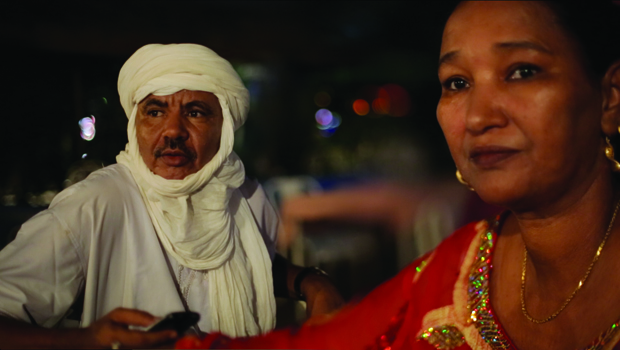
Malian musician Fadimata “Disco” Walet Oumar, with her husband, as featured in They Will Have To Kill Us First
UPDATE: The concert in Timbuktu did not go ahead as the Malian president Ibrahim Boubacar Keita declared a 10-day state of emergency following the deadly hotel attack.
Johanna Schwartz, director of They Will Have to Kill Us First, a documentary about exiled musicians in Mali, has spoken out on the attack and deaths at a hotel in the Malian capital, Bamako, today. The director has been trying to get in touch with the musicians covered in the documentary. She believes that a big concert in Timbuktu, planned for tomorrow, is still going to go ahead. Islamists have tried to stop music being played in Mali over the past few years, after they took control of parts of the country and declared it against sharia law. Many musicians fled the country.
Schwartz said: “My inbox has been flooded this morning with people wanting to know if Songhoy Blues, Disco or Khaira Arby are caught up in the hotel attack in Bamako. Songhoy Blues are right now in Paris, where they were supposed to perform this week. I wish I could say they were ‘safe in Paris’ but we all know that’s not true. Bataclan, the music venue that was attacked, is exactly the kind of venue Songhoy Blues are getting booked into these days. Khaira Arby is not in Bamako either, but in Timbuktu where a concert is planned for tomorrow evening. This will be the biggest concert in the city of Timbuktu since the music ban. (And much bigger than the street party gig that Khaira organised last year, which I filmed.) I just heard that the concert will indeed go ahead.”
She added: “An act of enormous courage from all involved. I think more than ever we need to take our cues from these great musicians, who resist these horrific attacks with every molecule in their body. They are wilfully defiant, but peacefully so. We don’t have to accept what these terror groups are trying to force upon the planet. But crucially, we need to understand why those who are accepting it are doing so. I just got off the phone with our local producer in Mali, he is calling Disco [musician Fadimata Walet Oumar] now to see where she is. A couple of his friends work at the hotel that is under attack as I type. He can’t get through to them on their phones.”
Index on Censorship has established a fund for musicians in exile in conjunction with the team behind They Will Have to Kill Us First.
4 Nov 2015 | Artistic Freedom, Index Arts, Magazine, mobile, Music in Exile, Student Reading Lists

Songhoy Blues
To mark the launch of the Music In Exile Fund, Index on Censorship has compiled a reading list of articles that have appeared in the magazine since 1982 and deal with censorship and music. We are offering these articles — which are normally held behind a paywall — for free.
Index on Censorship launched the Music In Exile Fund in partnership with the producers of They Will Have To Kill Us First: Malian Music In Exile – a documentary that follows musicians in Mali after the 2012 jihadist takeover during which music was outlawed. One band’s story featuring heavily in the film is Songhoy Blues, who are just one of many to feature in the Music In Exile Fund playlist.
The fund will contribute towards Index on Censorship’s Freedom of Expression Awards Fellowship, a year-long programme to support those facing censorship.
You can donate to the Music In Exile Fund here.

From the Autumn 2010 issue of Index on Censorship magazine. Subscribe.
Banned: A rough guide
Marie Korpe and Ole Reitov have been tracking the music censors and the censored for more than a decade. They reflect on the tactics of modern censorship
When we founded Freemuse ten years ago, our aim was to defend freedom of expression for musicians and composers. Since then, we have documented music censorship in more than 100 countries. At first, we were not aware of the size of the problem, but the longer we have worked in the field, the larger the challenges become. Maybe we are still only seeing the tip of the iceberg. While more journalists have got music censorship on their radar and a number of musicians have benefited from our support, it is still rare to find records of music censorship and violations of musicians’ rights to freedom of expression in reports from Amnesty, Human Rights Watch and other global free expression watchdogs.
Read the full article
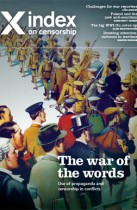
From the Spring 2014 issue of Index on Censorship magazine. Subscribe.
Change your tune?
Some homophobic lyrics in rap and reggae incite hatred and violence,
agree campaigners Peter Tatchell and Topher Campbell. But is
censorship the answer? First, Peter Tatchell explains why education will
help. Then Topher Campbell tells Alice Kirkland where he would draw
the line
Along with misogyny, homophobic lyrics have long blighted some rap and reggae music. Eminem and Buju Banton, among others, have found themselves in the firing line for their incendiary anti-gay hate music, ranging from rap songs containing insults like “faggot” to tracks that overtly glorify and encourage the murder of lesbian, gay, bisexual and transgender people.
Homophobic hate speech is wrong, regardless of whether it is expressed by a bully in the street or by a singer.
Read the full article
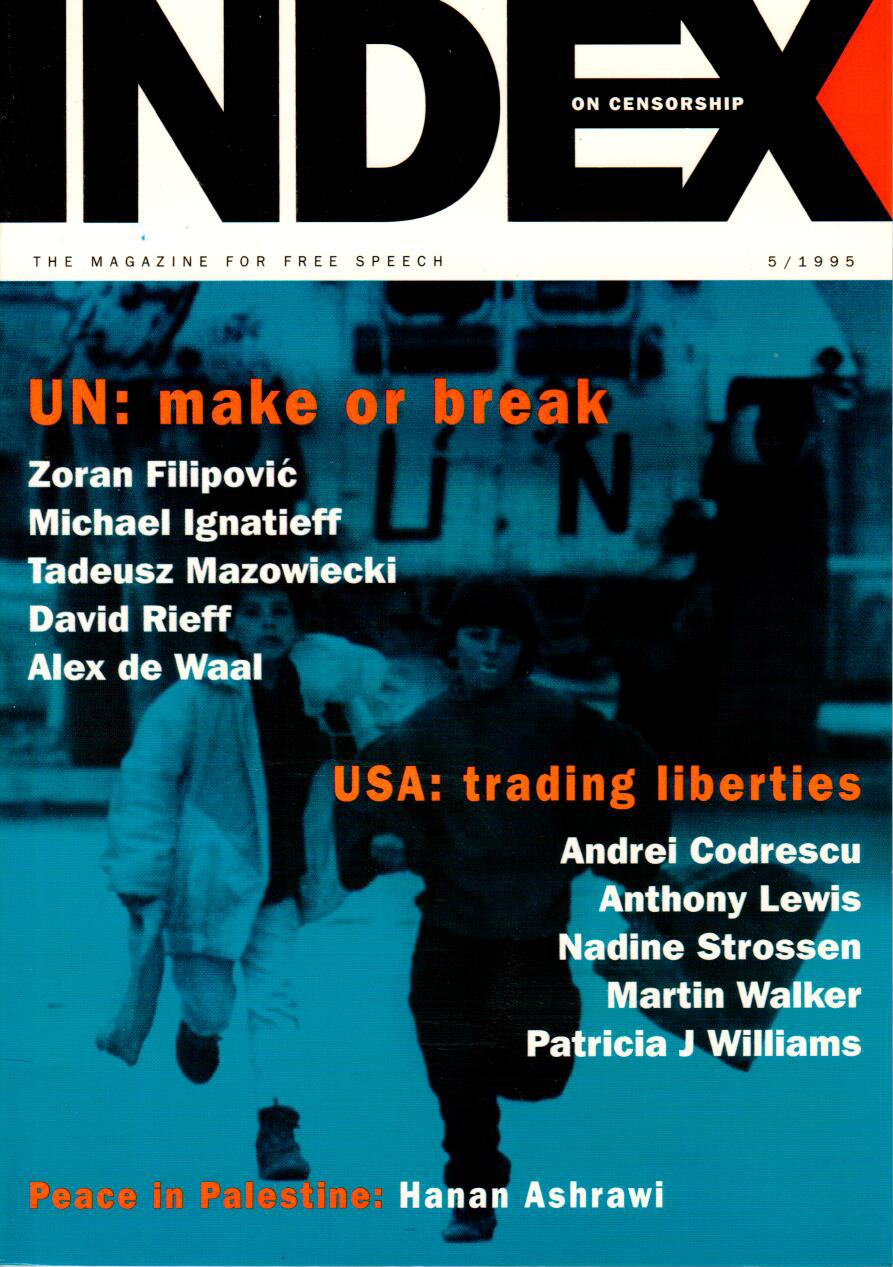
From the Autumn 1995 issue of Index on Censorship magazine. Subscribe.
To be young, alive and making music
Valrie Ceccherini writing in 1995 as part of a series focusing on the voices of those silenced by poverty, prejudice and exclusion
“My life has changed totally since the war,” says 20-year-old Ermin. He speaks of “the constant presence of death” with resignation. “I live shoulder to shoulder with death. Every time I go out, a missile could kill or wound me. Lots of my friends are dead. I think of them every day and 1 know 1 could join them at any moment. I’ve learned to live with this fear for three years now; there was no choice. I know it’s changed me. I’m harder, braver – or maybe I’ve just gone mad. Everybody here’s changed: everybody’s gone mad. You can’t help it after three years shut up in this hell.”
Emir is a slight youth of 17. “I used to spend most of my time away
from home, out with my friends. Now I scarcely ever leave home. It’s too dangerous.”
Read the full article

From the Autumn 2010 issue of Index on Censorship magazine. Subscribe.
Will Self on God Save The Queen
In the summer of 1977 I was 15 years old and wore an old tropical linen jacket I’d bought in a charity shop for a quid. It wasn’t so much off-white as ruinous, and it matched the colour of my shoes – winkle-pickers I’d painted myself using some kind of weird leather paint. Naturally I had to lie on my skinny rump to force my El Greco feet through the eight-inch ankles of my drainpipe jeans. Given all this sartorial mayhem it goes without saying that I absolutely concurred with the Sex Pistol’s front man, Johnny Rotten, when he sang, “God save the queen / The fascist regime”. Admittedly the causal connective “it’s” was lost in all the filth and the fury of his delivery, but we knew what he meant.
Actually, I can barely remember the circumstantial pomp that went into the celebration of the Queen’s Silver Jubilee, all I can recall is the Sex Pistols’ treasonable ditty, and the fact that it was banned from being played on the radio. At least I’m certain it was banned from the BBC’s Radio 1.
Read the full article

From the Winter 1998 issue of Index on Censorship magazine. Subscribe.
Tales of Terezín
Mark Ludwig for Index on Censorship on how the Nazis used music as a propaganda tool in the service of its doctrine of racial purity and superiority. Composers and musicians who did not fit the formula found themselves In the camps
In the 1920s, Weimar Germany was home to a rich and diverse mix of artistic and political movements. Composers stretched the boundaries of, and in some cases charted new courses for, classical music. Zeitmusik (music of the time), the 12 tone system and jazz were part of a new and excitingly diverse web of musical movements. As Hitler and the Nazi Party assumed control of Germany, the arts and the political climate were affected. Under the Nazi dictatorship, the arts – particularly music – were used as tools for indoctrinating and controlling the German nation with an ideology of national superiority, suppression and racial hatred.
Read the full article
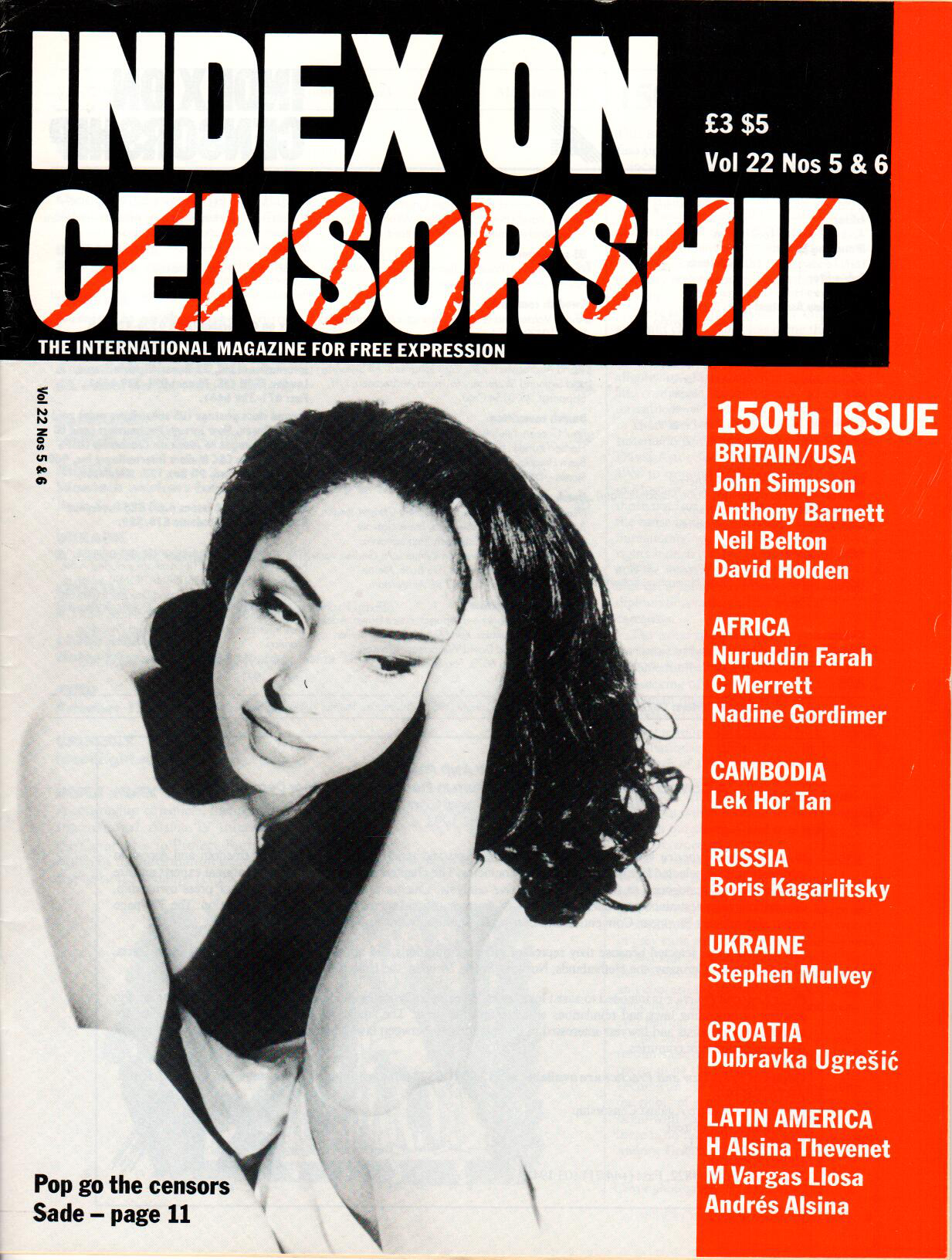
From the Spring 1993 issue of Index on Censorship magazine. Subscribe.
Pop go the censors
David Holden for Index on Censorship in 1993 on how anything — well almost — goes on the UK pop scene, but in the USA it’s a different story with Ice-T and the rappers sending shivers down parental spines
“Big boys bickering/fucking it up for everyone,” goes Paul McCartney’s 1992 song Big Boys Bickering. It’s an ecological song; the big boys bickering were the people at the Rio Earth Summit. About the song, McCartney has said: “When you talk about a hole in the ozone layer, you don’t talk about a flipping hole in the ozone layer, you talk about a fucking hole in the ozone layer. I know it might upset some of my fans, but I’m an artist, and I’m 50 years old and I think I can say what I like.”
Not on MTV America, Paul. According to the pop video channel, The Greatest Living Songwriter — faithful husband, caring parent, concerned citizen — is once again unsuitable for the youth of the USA.
Read the full article
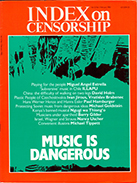
From the Winter 1983 issue of Index on Censorship magazine. Subscribe.
Banned in Bohemia
Vratislav Brabenec and Ivan Jirous tell the story of The Plastic People, a rock band which was seen as a threat by the Czech authorities during the Cold War
“Why should music be censorable?” asks Yehudi Menuhin on another page. Elsewhere in this issue the reader will see that in some parts of the world even certain musical instruments can be declared taboo by this or that military dictatorship. In Czechoslovakia since the early seventies it has been chiefly rock music that arouses the ire of the authorities – and those who insist on playing it find themselves not just banned but imprisoned.
Ah, but of course, one might say: if you set out to be a protest singer in a society ruled by a one-party dictatorship, what do you expect? The trouble with that line of argument is that The Plastic People of the Universe and the other rock groups with similarly strange names were not protest singers at all.
Read the full article
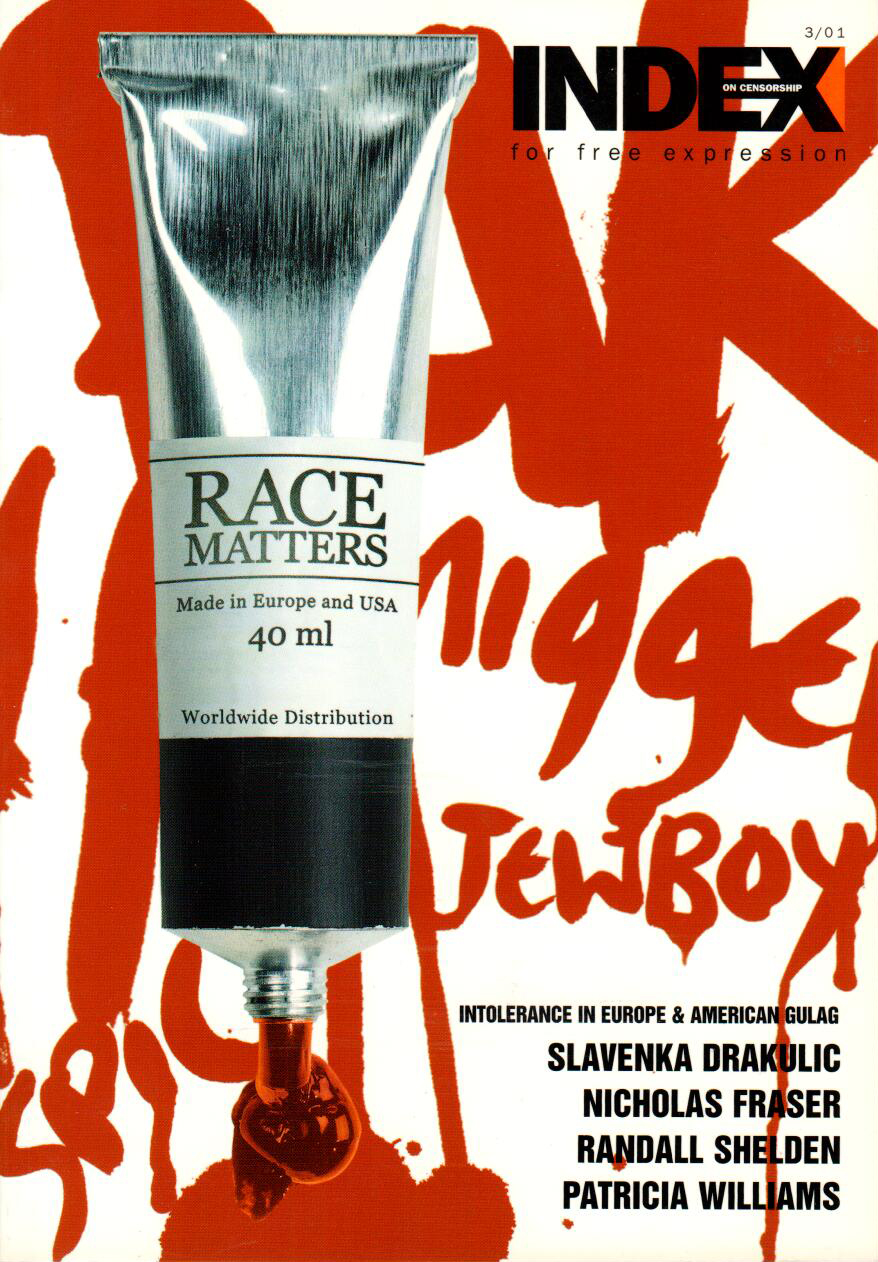
From the Summer 2001 issue of Index on Censorship magazine. Subscribe.
Music to hate with
Aided by the Internet, racist music has made inroads on European youth culture, says Heléne Löow
It was in the first half of the 1990s that White Noise music became the symbol of the growing racist subculture around Europe. Between 1990 and 1995, the music industry, then in a period of rapid expansion, gradually replaced the badly copied tapes, records that were hard to come by and roughly photocopied magazines with professionally produced CDs. The number of CDs on the market grew steadily; production became increasingly professional with Swedish White Noise record labels among the world’s most active producers.
By 1996, the first phase was over; for the next two years, production maintained its levels but there was no significant increase. By 1999, however, it was once more on the rise, along with white-power magazines, and other propaganda material.
Read the full article
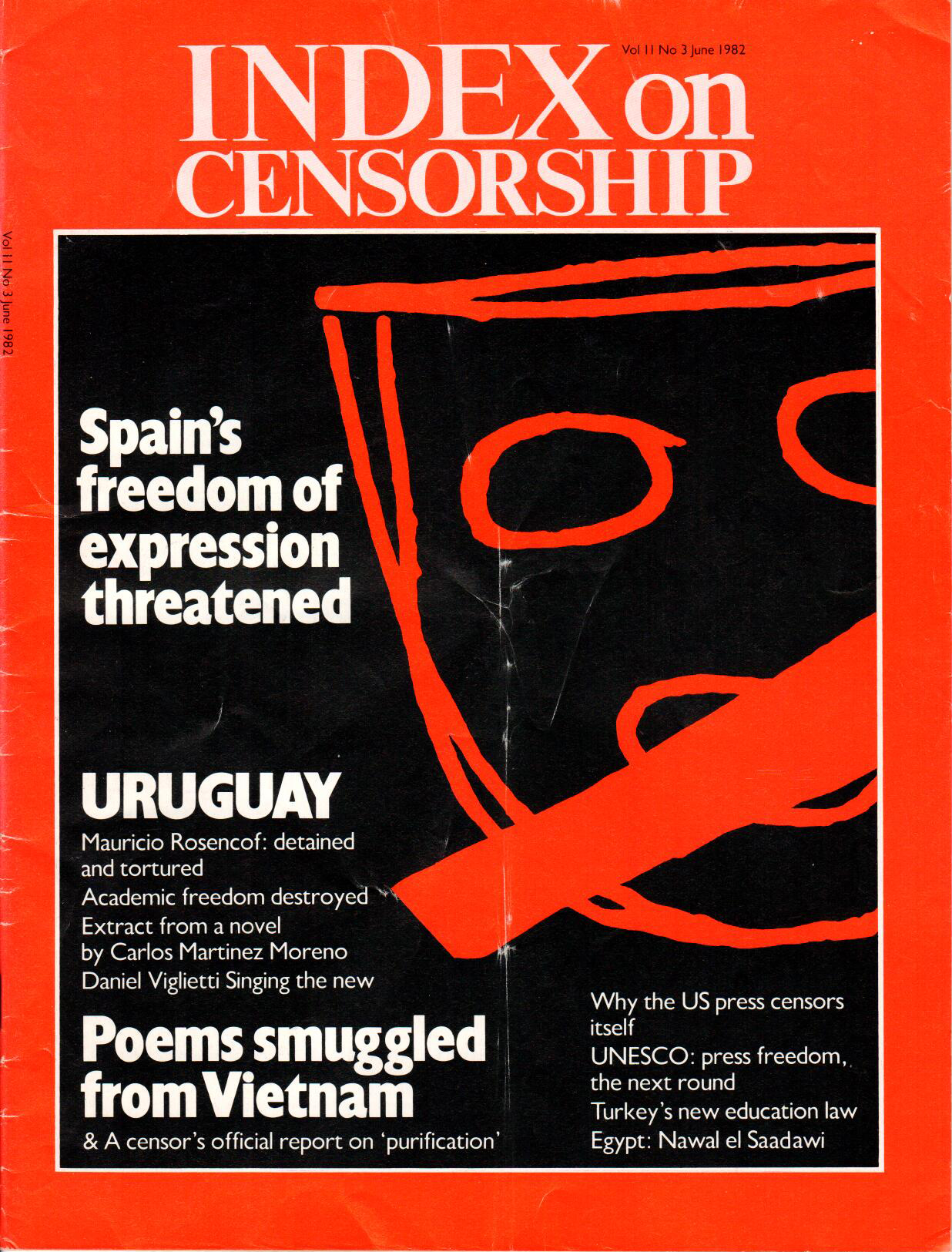
From the Summer 1982 issue of Index on Censorship magazine. Subscribe.
Singing the new
One of Uruguay’s best-known singers talks to Daniel Viglietti about his life in exile
I was first invited to this conference to participate, together with the Uruguayan writer Eduardo Galeano, in an event in which song and literature would work together, bringing together a man like Galeano, who writes with a pen, with someone like me, who, if you would allow me, writes with a guitar. Later on, the organisers phoned me to ask if I would add some thoughts about exile. I agreed to that, since I have been living in that situation now for eight years and one month. Given the nature of this occasion, I have attended some meetings handicapped by the fact that I do not speak English. For this kind of contribution, I need my mother tongue, Spanish. Today I have the advantage of a translation so I am going to throw out some ideas about the exile in which hundreds of thousands of Uruguayans have been living for eight, nine or even 10 years.
Read the full article
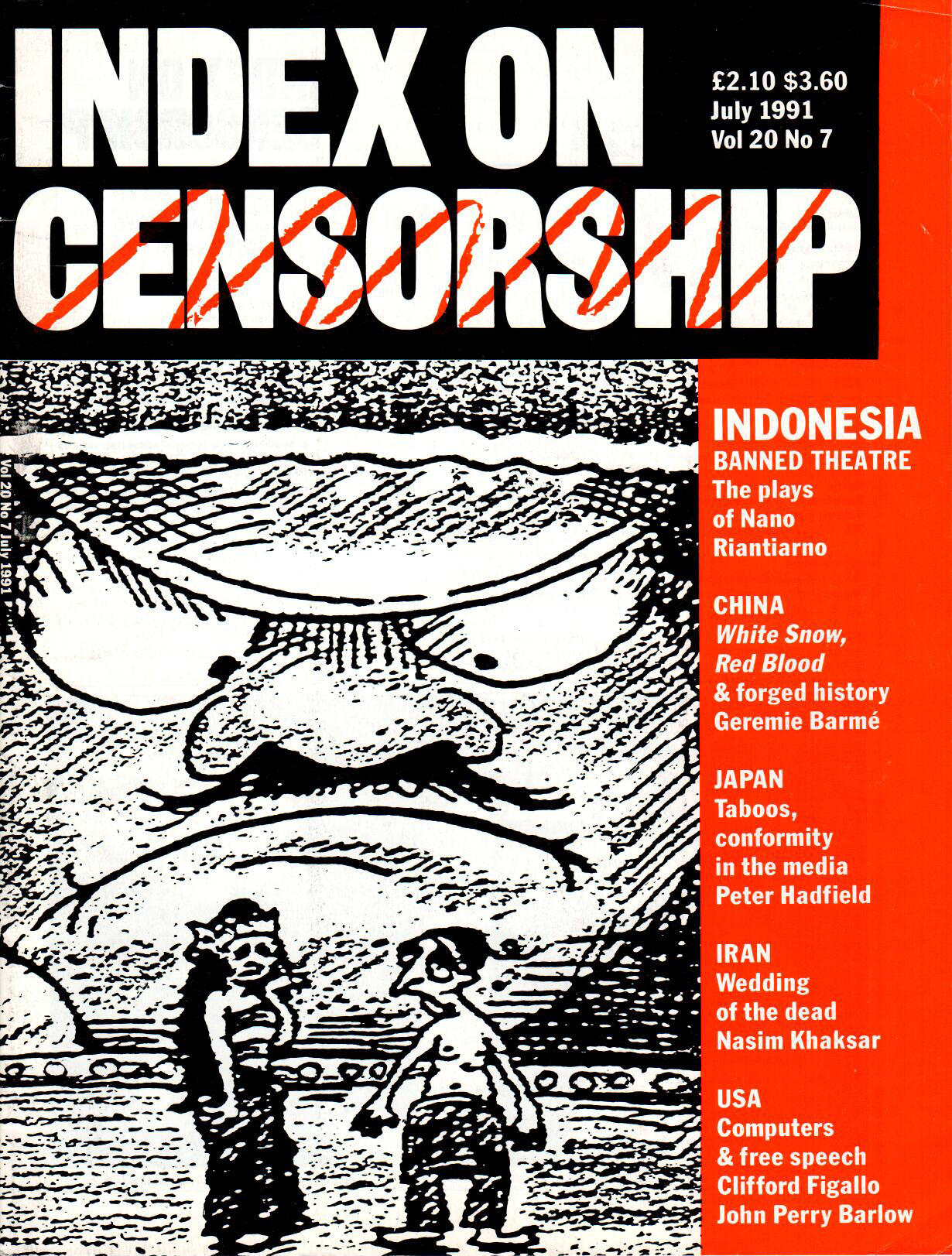
From the Summer 1991 issue of Index on Censorship magazine. Subscribe.
Chile: Cleansing the past
Nick Caistor on the Report of the Commission for Truth and Reconciliation, which revealed for the first time the details of how Chilean musician Victor Jara died
Victor Jara was one of the best-known singers and theatre directors during Salvador Allende’s Popular Unity government in Chile. From 1970 to 1973, Jara sang for the people and put on shows in shanty towns and factories, determined that popular culture should be at the heart of the government’s efforts to take Chile along its ‘path to Socialism’.
Shortly after the military coup led by General Augusto Pinochet on 11 September 1973, Victor Jara was taken prisoner. With hundreds of other suspects, he was held in the Chile stadium in the capital, Santiago. He was last seen alive as he was being transferred from there to the National Stadium on 15 September 1973.
Read the full article















